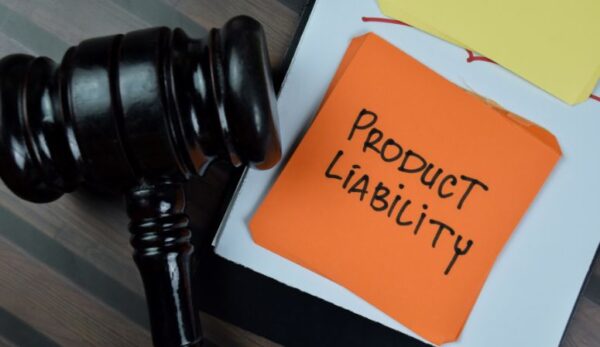Product liability lawsuits have been instrumental in holding manufacturers and distributors accountable for the harmful effects of their products. Among the various areas of product liability, lawsuits pertaining to cancer-causing products have gained significant attention.
In this blog post, we will delve into different product liability lawsuits concerning cancer, examining notable cases, legal principles, and their impact on individuals and society.
Also Read: Raw Sugar Shampoo Lawsuit
Talcum Powder Lawsuits
The use of talcum powder, a commonly used personal hygiene product, has led to a surge in lawsuits due to its alleged link to ovarian cancer and mesothelioma caused by asbestos contamination.
Reports suggest that talc usage increases a woman’s risk of ovarian cancer by 30 percent to 60 percent, with a particularly heightened risk among black women.
A study conducted by Joellen M. Schildkraut and published in Cancer Epidemiology, Biomarkers & Prevention in 2016 revealed that the use of talcum powder in the genital area significantly increased the risk of ovarian cancer among African American women, with a 44 percent higher risk compared to non-users. These findings shed light on the potential hazards associated with talc-based products.
Pharmaceutical and consumer goods companies, including industry giant Johnson & Johnson, have faced substantial legal ramifications as a result of the talcum powder lawsuits. With over 40,000 lawsuits filed against Johnson & Johnson for their Baby Powder product, the company has agreed to a staggering $9 billion settlement, as reported by TorHoerman Law.
Roundup Weed Killer Lawsuits
Glyphosate, the active ingredient in Roundup weed killer, has faced intense scrutiny in recent years as plaintiffs claim it is linked to cancer, particularly non-Hodgkin lymphoma. A 2019 study by University of Washington researchers found that glyphosate use increases the risk of non-Hodgkin lymphoma by 41 percent.
These high-profile lawsuits have resulted in substantial damages awarded to individuals who have successfully proven the connection between their cancer and Roundup use. The safety of widely used herbicides and the need for stricter regulations have become the focus of ongoing debates.
Roundup lawyers are still accepting claims for potential trials or settlements, and Bayer, the parent company, offered a $10.9 billion settlement for around 100,000 existing claims, though a judge rejected their proposal to settle future claims for $2 billion, indicating that the legal battles surrounding the Roundup Lawsuit are far from over.
Asbestos-Related Lawsuits
Asbestos, a well-known carcinogen, has been the subject of extensive product liability litigation spanning several decades. These lawsuits primarily involve individuals who have developed asbestos-related cancers, such as mesothelioma or lung cancer, as a result of occupational exposure.
The companies responsible for manufacturing or utilizing asbestos-containing products have faced significant legal repercussions for their failure to adequately warn about the dangers of asbestos or provide proper protective measures.
According to the Centers for Disease Control and Prevention, there is an average of 1,290 asbestos-related deaths in the United States each year. These statistics highlight the severe health consequences associated with asbestos exposure.
On a global scale, the World Health Organization reports that over 90,000 individuals lose their lives annually due to asbestos-related diseases, including mesothelioma.
The magnitude of the issue is further exemplified by the sheer number of ongoing asbestos litigation cases, which currently exceed 200,000. Additionally, it is projected that approximately 50,000 new lawsuits will be filed each year.
Considering the financial aspect, the typical settlement amounts for asbestos claims fall within the range of $1 million to $1.4 million, as indicated by Mealey’s® Litigation Reports.
E-cigarette and Vaping Lawsuits
The increasing popularity of e-cigarettes and vaping products has given rise to a wave of lawsuits alleging that the use of these devices has led to severe lung injuries, including lung cancer.
Many of these cases revolve around the presence of harmful substances such as nicotine, heavy metals, or toxic chemicals in devices or e-liquids. These lawsuits shed light on the urgent need for robust regulations, comprehensive testing procedures, and transparent disclosure of potential health risks associated with these products.
The data provided by the Centers for Disease Control and Prevention (CDC) further emphasize the severity of the issue. Between 2019 and 2020, the CDC reported over 3,000 cases of e-cigarette or vaping product use-associated lung injury (EVALI) in the United States alone.
In addition, a study conducted by the National Institute of Health revealed through regression analysis that individuals who use e-cigarettes have a 2.2 times greater risk of developing cancer when compared to non-smokers.
This finding raises serious concerns about the potential long-term health consequences of e-cigarette usage, including the heightened risk of developing cancer.
As a result of these health concerns, e-cigarette manufacturers, like Juul, are facing numerous lawsuits related to lung injuries. As of March 16, 2023, there have been a total of 5,969 Juul lawsuits filed across the United States, which have been consolidated into multidistrict litigation (MDL) under MDL-2913. These cases encompass both class action lawsuits and individual personal injury claims that have been filed in four different states.
Conclusion
Product liability lawsuits pertaining to cancer play a vital role in ensuring justice, accountability, and safeguarding public health. The cases discussed in this article emphasize the significance of rigorous testing, accurate labeling, and responsible manufacturing practices.
It is essential for readers to be aware and concerned about these issues. If you or someone you know has experienced adverse health effects related to product usage, it is advisable to seek legal recourse.
These lawsuits hold manufacturers and distributors responsible for the potential harm their products may inflict, ultimately contributing to a safer marketplace and increased consumer awareness.

